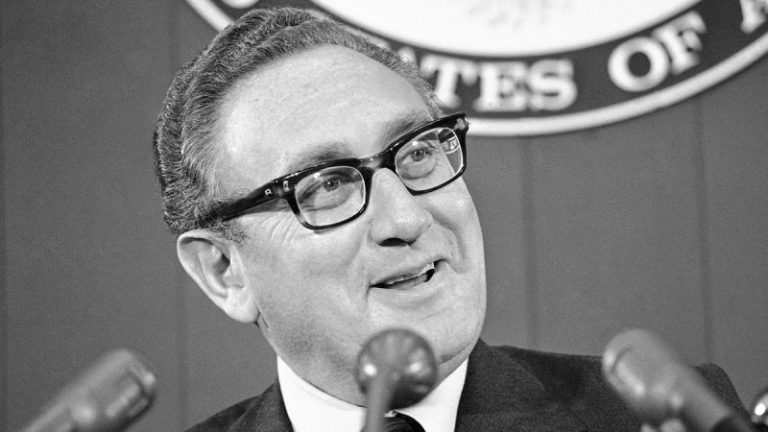Former Secretary of State Henry Kissinger, who died Wednesday at age 100, exerted far-reaching influence on global affairs under Presidents Richard Nixon and Gerald Ford between 1969 and 1977, earning both vilification and the Nobel Peace Prize.
Here are five things to know about his life in government and beyond:
HIS PORTFOLIO
For eight restless years — first as national security adviser, later as secretary of state, and for a time as both — Kissinger played a dominant role in foreign policy.
He conducted the first ‘shuttle diplomacy’ in the quest for Middle East peace. He used secret negotiations to restore ties between the United States and China. He initiated the Paris talks that ultimately provided a face-saving means to get the United States out of war in Vietnam. And he pursued detente with the Soviet Union that led to arms-control agreements.
HIS BOSS
Kissinger’s power grew during the turmoil of the Watergate scandal, when the politically attuned diplomat took on a role akin to co-president to the weakened Nixon. ‘No doubt my vanity was piqued,’ Kissinger later wrote of his expanding influence during Watergate. ‘But the dominant emotion was a premonition of catastrophe.’
Kissinger told colleagues at the White House that he was the one person who kept Nixon, ‘that drunken lunatic,’ from doing things that would ‘blow up the world,’ according to Walter Isaacson, who wrote the 1992 biography ‘Kissinger.’
HIS CACHET
Pudgy and messy, Kissinger acquired a reputation as a ladies’ man in the staid Nixon administration. Kissinger called women ‘a diversion, a hobby.’ Isaacson wrote that Hollywood executives were eager to set him up with starlets, whom Kissinger squired to premieres and showy restaurants. His companions included Jill St. John, Shirley MacLaine, Marlo Thomas, Candice Bergen and Liv Ullmann.
In a poll of Playboy Club Bunnies in 1972, the man dubbed ‘Super-K’ by Newsweek finished first as ‘the man I would most like to go out on a date with.’ Kissinger’s explanation: ‘Power is the ultimate aphrodisiac.’
HIS CRITICS
Kissinger for decades battled the notion that he and Nixon had settled in 1972 for peace terms in Vietnam that had been available in 1969 and thus had needlessly prolonged the war at the cost of tens of thousands of American lives.
He was castigated for authorizing telephone wiretaps of reporters and his own National Security Council staff to plug news leaks in Nixon’s White House. He was denounced on college campuses for the bombing and allied invasion of Cambodia in April 1970, intended to destroy North Vietnamese supply lines to communist forces in South Vietnam.
That ‘incursion,’ as Nixon and Kissinger called it, was blamed by some for contributing to Cambodia’s fall into the hands of Khmer Rouge insurgents.
HIS LATER YEARS
Kissinger cultivated the reputation of respected elder statesman, giving speeches, offering advice to Republican and Democratic presidents alike and managing a lucrative global consulting business as he traveled the world.
But records from the Nixon era, released over the years, brought with them revelations that sometimes cast him in a harsh light. Kissinger was dogged by critics at home and abroad who argued that he should be called to account for his policies on Southeast Asia and support of repressive regimes in Latin America.
He had to think twice before traveling to certain countries to be sure that he would not be summoned by judges seeking to question him about Nixon-era actions.

